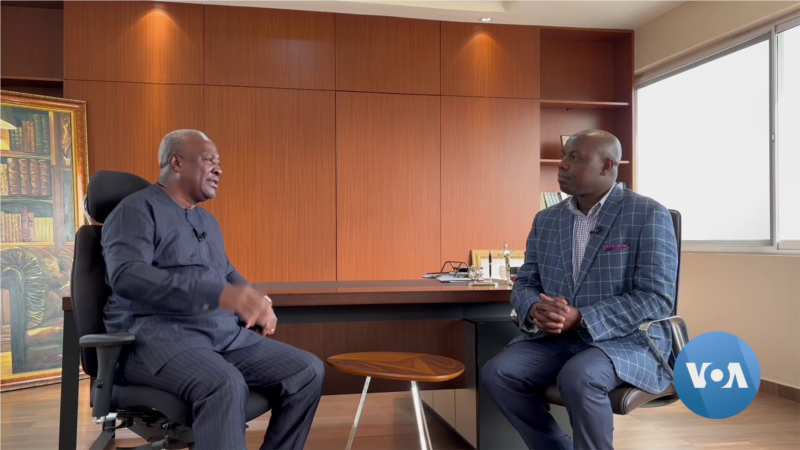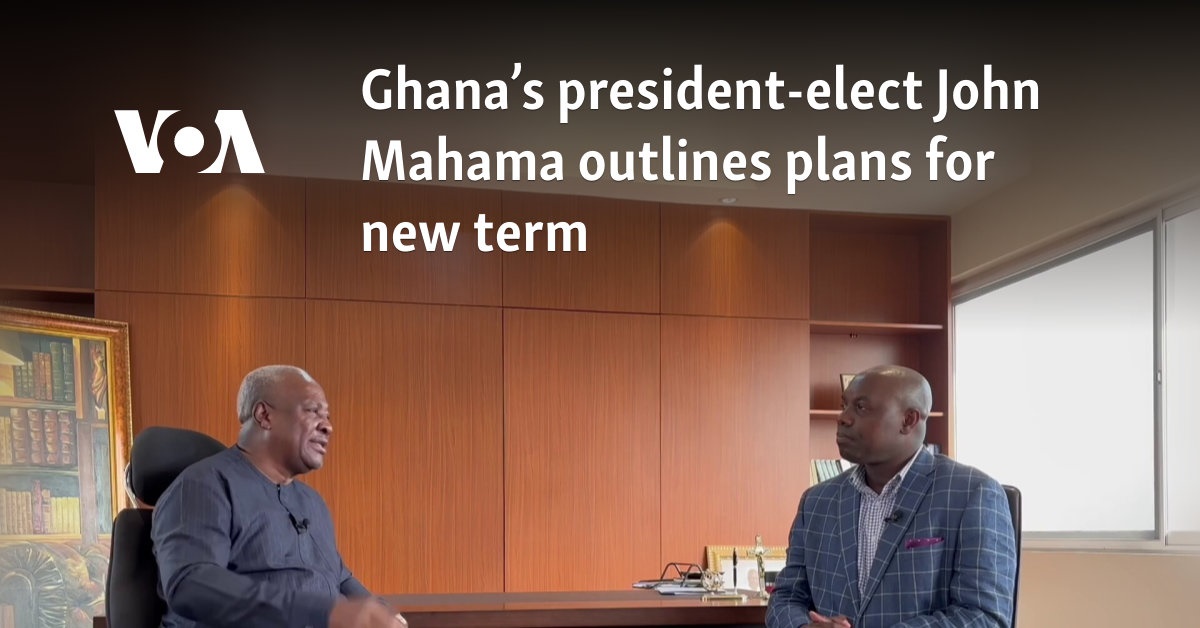This website uses cookies so that we can provide you with the best user experience possible. Cookie information is stored in your browser and performs functions such as recognising you when you return to our website and helping our team to understand which sections of the website you find most interesting and useful.


ACCRA, GHANA —
In an exclusive interview with VOA, Ghana's President-elect John Mahama has outlined his vision for improving life for the average Ghanaian following his victory in last week’s general elections. Mahama, who campaigned on reviving Ghana’s struggling economy and tackling unemployment, discussed his plans for job creation, school reform and preserving the environment while allowing small scale miners to make a living. VOA English to Africa’s Paul Ndiho sat down with Mahama on December 13 in Ghana’s capital, Accra.
This interview has been edited for clarity and brevity.
VOA’s Paul Ndiho: Let’s start with the economy. Everyone talked about how the economy was not doing very well for an ordinary Ghanaian. You promised to revive and reset the economy. Let’s start there, Mr. President-elect.
President-Elect John Mahama: I said during the campaign, “It’s the economy, stupid,” quoting from Bill Clinton’s campaign. People thought I was being offensive, but it did come down to the economy. All the opinion polls showed the economy and employment were the most critical issues. So, we focused our message on job creation and economic recovery, and eventually, it paid off.
If the economy is in a bad way, it affects education, agriculture, sports, it affects every sector of the country. So, we’re going to have to be dealing with stabilizing the economy.
Unfortunately, in this circumstance, we have two significant issues.... Reducing inflation is our number one priority. Stabilizing the currency is number two. We also need to bring the deficit down, cut expenditures, and increase revenues. Those are the things that we need to be looking at.
Paul Ndiho: Let’s talk about unemployment. Young people say there are no jobs. What will you do in your first 100 days to reassure them that Ghana can provide opportunities?
Mahama: Job creation is not any event; it is a process. And so, you’ll need more than one stroke of the pen to create the number of jobs you want. The first step is restoring the economy to health and on the path of growth. That in itself will begin to drive jobs. Businesses are suffering. Many businesses have laid off people just because of the economic crisis. And so, it is just bringing the economy back and letting companies grow again. And rejigging the construction sector and investing in infrastructure. Carpenters, masons, and steel builders will begin to get work again. And so, that is our number one priority.
We are not interested in the artificial job creation measures that have been done in the past, like NABCO, Nation Builders Corps, where young people were taken through three years of building their allowance and promised that they would graduate into jobs. And at the end of the process, they’ve been abandoned. We already have the youth employment agency that is creating those opportunities for training and job orientation.
If you look at the government sector, the government sector employees are less than a million people out of a population of 33 million. The best place to get a job will be for the private sector to grow.
Now that we have the African Continental Free Trade Area, it should be possible for us to encourage Ghanaian businesses to take advantage of it and increase production so that we can export to those African countries.
Paul Ndiho: Let’s move on to education. Many young people fear your administration might cut the free high school education program. Will you keep it?
Mahama: Free SHS [Free Senior High School] has come to stay, and it is not going anywhere. Nobody is going to scrap it. We will help make it more efficient so that the teachers, the parents, and the students get the best out of the free access.
We’re going to look at the basic school level, too... The basic level is becoming a significant problem. 1.3 million pupils at a basic level need furniture. They don’t have tables and chairs to sit on. They lie on their stomachs in the classroom or sit on cement blocks. And that’s because all our focus has been on the secondary school level.
So, we’re going to hold a national education forum, which will bring all the stakeholders together. And we’re going to look at the whole education value chain. And we're going to come in by consensus. All of us are nonpartisan. Everybody from every walk of life who has a stake in education will attend that conference. We’re going to make important decisions on how to reform our education so that the children get better quality and better value for money.
We’re going to improve the quality of the food for the children. We’re going to expand the infrastructure so that they have dormitories, classrooms, and dining halls so that they can get the most out of secondary education.
Paul Ndiho: There is this issue of Galamsey [term for illegal small-scale gold mining in Ghana] that has caused a lot of tension and agitation. What can you say about it? How are you going to put an end to it?
Mahama: One of the first things is to pass the law to ban mining in forest reserves. When this government came to pass, an airline that allowed forest entry was possessed. And since the last eight years, seven forest reserves have seen incursions into 37 forest reserves. Some have been almost destroyed.
The first thing to do is stop mining in forest reserves because that’s where all the rivers get their catchment area. That’s where the water comes into the rivers. The next thing is to clean up the rivers and stop mining and pouring the effluent into the rivers. And so, we’re good to work with the Minerals Commission and the Environmental Protection Agency (EPA) to see how we implement the law.
But let me explain. People need to distinguish between small-scale mining and illegal mining. Small-scale mining is legal. There are ways of doing it without destroying the environment in Canada, Australia, and the United States. Technology exists. So why don’t we reduce that technology and train our people to do mining in a way that is safe for the environment? We’re willing to consider those things.
This Q&A originated in VOA’s English to Africa Service.



 Africana55 Radio
Africana55 Radio 
